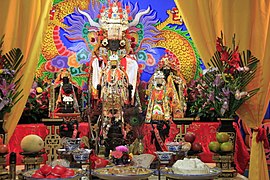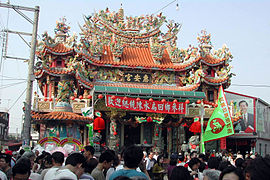Taiwanese folk beliefs
This article has an unclear citation style. (July 2022) |

Taiwan folk beliefs are traditional beliefs widely circulated in
Chinese world, with 93% of people following mixture of Buddhism, Confucianism, and Taoism , Christian 4.5%, other 2.5%.[1]
Chinese folk religion in Taiwan is framed by the ritual ministry exerted by the
fashi (non-Taoist ritual masters), and tongji media. The Chinese folk religion of Taiwan has characteristic features, such as Wang Ye worship.[2] Even though Falun Gong is banned in China, people in Taiwan are free to practise it.[3]
Gallery
-
Folk Taoists officiating a ceremony in Taichung.
-
An altar dedicated to various gods at a temple in Tainan.
-
Temple of Fude in Wujie, Yilan.
-
Hui'an Temple in Kuantien, Tainan. The festival welcomed politician Chen Shui-bian home after his 2004 re-election.
-
Hotsu Longfong Temple dedicated to Mazu in Miaoli.
-
Temple of Guandi in Hsinchu.
References
Footnotes
- ^ mixture of Buddhist, Confucian, and Taoist 93%, Christian 4.5%, other 2.5%《The Global Situation》Quinton Crawford (2010)
- ^ Clart & Jones (2003), Ch. 5 (p. 98-124).
- ^ 中央管法輪功廣告,台南市長認為不妥。 (in Chinese). Executive Yuan.
Bibliography
- Rubinstein, Murray A. (2014). Taiwan: A New History. Routledge. ISBN 9780765614957.
- Clart, Philip; Jones, Charles B., eds. (2003). Religion in modern Taiwan: tradition and innovation in a changing society. Honolulu: University of Hawai'i Press. ISBN 9780824825645.
- Clart, Philip; Ownby, David; Wang, Chien-chuan (2010). "Text and Context: Redemptive Societies in the History of Religions of Modern and Contemporary China". University of Leipzig.
- Brown, Deborah A.; Cheng, Tun-jen (January 2012). "Religious Relations across the Taiwan Strait: Patterns, Alignments, and Political Effects" (PDF). Orbis. 56 (1): 60–81. .






